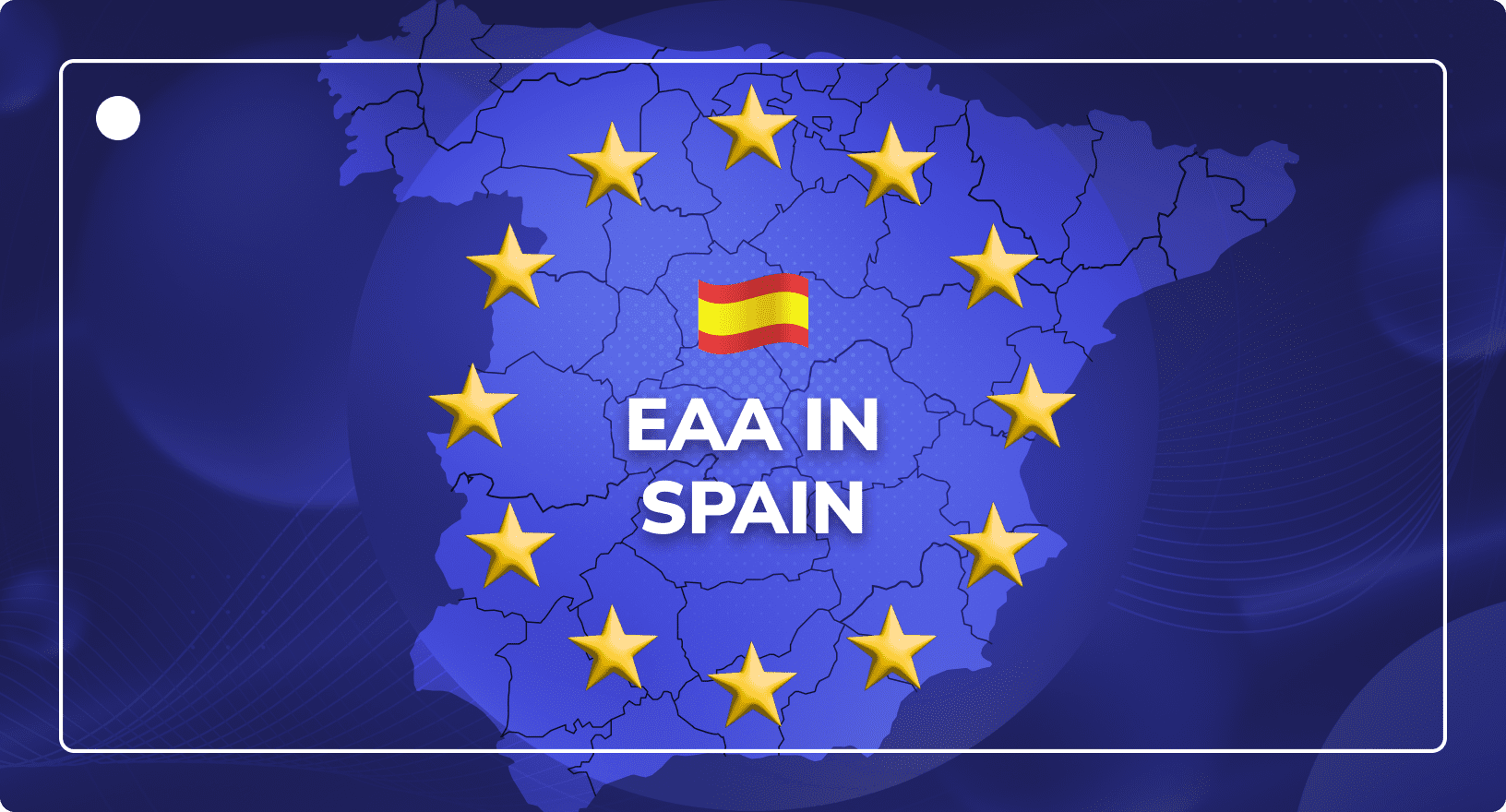European Accessibility Act In Spain: How to Comply with Ley 11/2023
Digital Accessibility
Updated on June 14, 2025
From 28 June 2025, a big change will come to Spain. This is because of Ley 11/2023. It’s the national version of the European Accessibility Act (EAA) in Spain. It makes accessibility not just a good idea, but a legal duty.
If your business sells online, your digital tools, like websites, apps, videos and checkouts, must work for everyone. That includes people with disabilities.
If you’re not ready, now is the time to act.
What Is the European Accessibility Act?
The European Accessibility Act is a new EU-wide law proposed by the European Commission. It aims to make products and services easier to use for everyone. That includes people who are blind, deaf, have limited mobility, or use assistive technology.
This law affects e-commerce, banking, ticket machines, transport, and more.
In Spain, Ley 11/2023 brings the EAA into national law. From mid-2025, you must follow the new accessibility rules for products and services if you:
- Sell products online
- Offer digital services to consumers
- Run self-service kiosks, mobile apps or platforms
The rules focus on digital design for websites and mobile apps. That means your systems must be clear, easy to use, and work with assistive tools like screen readers.
Why This Matters for Spanish E-Commerce

Spain has about 4.38 million people with disabilities, according to 2020 data. That’s over 9% of the population. Many of these people shop online.
If your site doesn’t work for them, they can’t buy from you.
Making your digital services more accessible isn’t just the law—it’s good business:
- More people can use your site
- Better design helps all users
- You reduce drop-offs at checkout
- You increase trust and repeat customers
Think of it this way: more access = more sales.
What Must Your Business Do?
1. Make Your Website and App Accessible
Use the WCAG 2.1 AA standard. While a global standard, it’s almost like a rulebook all European Union member states must follow to ensure compliance for web accessibility. It covers:
- Using text that’s easy to read
- Letting people move around the site using a keyboard
- Making sure screen readers work on all pages
- Adding captions to videos and alt text to images
2. Fix Your Checkout Process
The payment journey must be easy for all. That means:
- No confusing steps
- Clear form labels
- Helpful error messages
- A logical, smooth flow
Think of the checkout like a doorway. If it’s too narrow, some people can’t get through.
3. Update Customer Support
If your only support option is a phone number, that’s a problem. Some people can’t use phones.
Offer other ways to get help, such as:
- Live chat
- Contact forms with screen reader support
You’ll help more people and show that you care.
4. Consider In-Store and Banking Tools
Ley 11/2023 also applies to:
- ATMs
- Ticket machines
- In-branch digital screens
- Online banking
Make sure these tools are simple and accessible.
What Happens If You Don’t Comply?
You can’t opt out.
Penalties in Spain range from €30,000 to €600,000 per violation.
In 2023, Vueling Airlines was fined €90,000 for an inaccessible website. That’s just one example. On top of the fine, they faced bad press and public backlash.
Non-compliance also means:
- Losing customers
- Damaging your brand
- Fixing things later at a higher cost
The smart move? Prepare now. It’s cheaper, safer, and better for business.
Who Must Follow This Law?
Any company selling products or services in Spain must comply. This includes:
- Online stores (small or large)
- Banks and insurance firms
- Public transport operators
- Telecom providers
- Any business offering digital platforms
It doesn’t matter if you’re local or global. If you sell to Spanish customers, this law applies.
EAA Comparison Guide: Spain vs Other European Countries
Risks of Non-Compliance with Spanish Accessibility Requirements
Non-compliance with Spain’s Ley 11/2023, which transposes the European Union’s Accessibility Act, comes with numerous serious risks that your business must now consider. Fines for non-compliance can range from €30,000 to €600,000, for very serious infractions, dependent upon the breach. From a financial perspective, the costs incurred by lawsuits and corrective actions taken post-factum are almost always higher than the active cost of compliance.
For example, Vueling Airlines was fined €90,000 for not making its website accessible. Non-compliance is riskier reputationally, with negative press, customers leaving and market share loss. This not only keeps you in line with the law but also solidifies your standing in the minds of people who will conduct business with you.
Steps to Become Compliant with the European Accessibility Act in Spain
Compliance with Ley 11/2023 is important if you want your organisation to operate in Spain and other EU countries. Digital accessibility features are both a legal requirement and a way to provide a smooth experience for all of your customers, including those with disabilities.
Step 1: Do an Accessibility Audit
Scan your website, app, and other tools using checkers like:
- Axe
- WAVE
- Lighthouse
These will highlight the biggest problems.
Step 2: Write an Accessibility Statement
Your accessibility statement should clearly state all steps you will take to ensure you meet accessibility standards, and provide a way to receive feedback on accessibility issues.
Step 3: Fix What’s Broken
Based on the audit, improve:
- Layouts and colour contrast
- Navigation structure
- Alt text for media
- Mobile responsiveness
Step 4: Train Your Teams
Teach your staff what digital accessibility means. Include:
- Designers
- Developers
- Content writers
- Support agents
Everyone should understand what’s at stake, and be aligned on the steps the organisation should take to be complaint with the European Accessibility Act.
Step 5: Bring in Outside Help
Accessibility experts can help you fix issues faster. They know the rules and can give legal guidance, or even help you write an accessibility statement.
Step 6: Keep Testing
Set a schedule to review accessibility every few months. Make it part of your process to have ongoing compliance checks.
Step 7: Plan for the Long Term
This isn’t a one-time job. Rules may tighten after 2025. If you start strong, future changes to digital accessibility standards will be easier.
What Happens After 2025?
After the 2025 deadline, accessibility will keep growing in importance. More sectors may face rules—such as transport, banking, or even online entertainment.
Also, technology will keep evolving. You’ll need to keep up with:
- Voice interfaces
- AI tools
- New screen readers
- Changing laws across EU member states you sell into
The goal stays the same: make sure everyone can use your services, no matter their ability.
Meeting Spanish EAA Requirements with DemoUp Cliplister
Meeting Spanish EAA compliance requirements doesn’t have to be complex. DemoUp Cliplister helps you balance how you control accessibility across all of your media assets, ensuring government-compliant products and services that are approved for retailer websites.
Our platform scans images, videos, 3D models and PDFs and associated metadata to ensure they meet new European Union standards and the European Accessibility Act.
Don’t have metadata? No problem. We can generate it for you so your content remains usable and compliant to the new web accessibility directive.
Our EAA-compliant players provide retailers with a fully accessible and compliant way to display 3D models and product videos directly in your image gallery.
The European Accessibility Act isn’t just another law. It’s a push for a fairer internet.
Complying with Ley 11/2023 means:
- Opening your site to more customers
- Avoiding big fines
- Building trust with every visitor
The best time to prepare was yesterday. The second-best time is now.
Ready to act? Read more on our blog, or get in touch today.
Frequently Asked Questions
If you sell online in Spain, Ley 11/2023 matters to you. It brings the European Accessibility Act into Spanish law. That means your digital services must work for everyone including people with disabilities. Here are the most common questions businesses ask.
Better Content. More Sales.

Fill out the form to discover our end-to-end eCommerce content solutions for brands & shops




